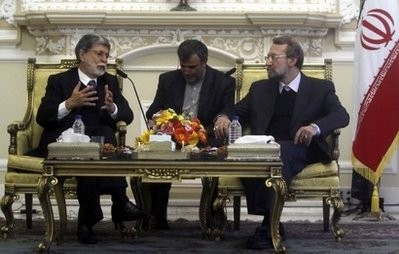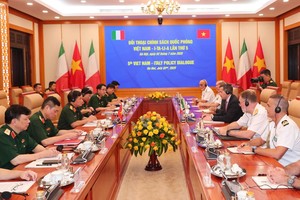UN Security Council member Brazil demanded on Tuesday that Iran guarantee its nuclear programme has no military aims, but added that it will work to avoid new sanctions against the Islamic republic.

Brazilian Foreign Minister Celso Amorim also urged Iran and world powers to show "flexibility" over an atomic fuel deal stalled for several months, saying it was an agreement that could build confidence among all sides.
"Iran should have peaceful nuclear activities, but the international community should be given guarantees that there will not be violation and diversion (of nuclear technology) towards military aims," Amorim, who is on a two-day visit, said at a press conference in Tehran.
Brazil, a temporary member of the 15-strong Security Council, has consistently defended Iran's nuclear programme.
Amorim said Iran's nuclear "impasse" must see a solution.
"It has dragged on for seven years and in these years Brazil has come closer to Iran," he said.
"We want a solution to this impasse. Brazil is interested in having a role in settling Iran's nuclear issue. I heard the explanation from Iranian sides in my long meeting (with Iranian counterpart Manouchehr Mottaki). It was constructive."
Amorim's visit paves the ground for next month's visit by Brazilian President Luiz Inacio Lula da Silva.
Earlier on Tuesday Amorim told Iran's official IRNA news agency that Brazil would work to prevent new sanctions against Tehran.
"We are looking for a way to prevent sanctions against Iran because we think that sanctions are ineffective," Amorim told IRNA.
"The only thing the sanctions achieve is that they hurt people, especially the lower class of people."
World powers accuse Iran of masking a weapons drive under the guise of what Tehran says is a purely civilian atomic programme.
Western countries led by the United States have stepped up efforts to impose a fourth round of sanctions against Iran, especially after a nuclear fuel deal for a Tehran research reactor drafted by the UN in October hit a deadlock.
For a sanctions measure to pass, nine of the 15 council members would have to vote in favour and none of the five permanent members veto it.
Amorim had said on Monday that a UN sanctions resolution targeting Iran would be a "negative and unfair move."
"What we want for the Brazilian people is what we want for the Iranian people, which is expansion of peaceful nuclear activities," he told Iran's top nuclear negotiator Saeed Jalili during a meeting.
On Tuesday, he urged Iran and world powers to finalise the nuclear fuel deal for the Tehran reactor.
"We hope this agreement will take place. This agreement is a major one and creates confidence between Iran and the IAEA (International Atomic Energy Agency), but like any other negotiation there should be flexibility on all sides," Amorim said.
Talks between Iran and world powers over the proposed deal stalled after Tehran's insistence that the transfer take place on its soil, a condition rejected by world powers.
In his interview with IRNA, Amorim even said Brazil could consider hosting the fuel exchange on its territory.
"As of now there is no proposal, but if we receive such a proposal, it could be examined," Amorim said when asked whether Brazil might make such an offer.
On top of a new round of UN sanctions, top Western officials are also looking at restricting fuel supplies to the Islamic republic as a way of stepping up pressure on Tehran over its controversial nuclear programme.
To offset possible fuel sanctions, the head of National Iranian Oil Refining and Distribution Co, Nooreddin Shahnazi-Zadeh, said Iran has increased its stockpile of petrol by more than one billion litres (220 million gallons) and plans to boost domestic production.








)















